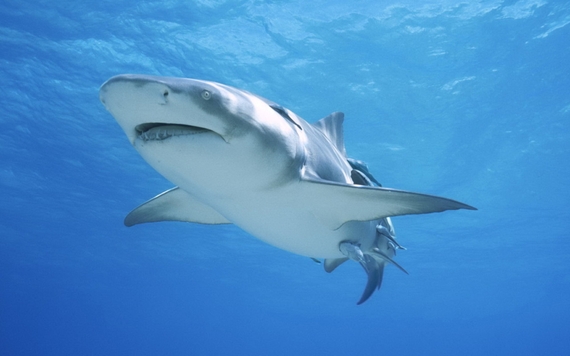If you're like a lot of people, you headed to the beach this year but were stressed out over the reports of shark attacks in shallow water.
Since the beginning of June, it seemed there was regular news of shark attacks--the latest in Australia when a brave surfer actually punched a shark in the nose during an attack and escaped. One thing's for sure: the reports kept plenty of swimmers out of the water.
And what does that do for our mental health? Suddenly, the stress-free vacation that we had planned and were really looking forward to turned into an anxiety-filled week. Many a parent sat upright in their beach chair, scanning the water for danger as their children played in the surf. Not exactly the relaxing time we all look for. But while no one can ever guarantee your safety at the beach, the danger (perceived or not) points to some interesting things about the neuroscience of stress and anxiety.
Enhanced memory
One of the byproducts of increased levels of anxiety is that stress hormones are elevated in your body. When that happens--in a moderate amount--your memory is enhanced.
Think back for a moment to vacations you took as a child. What will likely come back are feelings or brief moments in time. Add in a little bit of stress, and this year's beach vacation will be one that will stay with you for a lot longer.
Instead of the usual relaxing time, you'll remember this as the time you went to the beach or swam in the ocean when there were shark attacks on the rise. It will be a touchstone experience as far as vacations go, which can make for clearer and longer-lasting memories.
After all, one of the main reasons people take vacations is for the lasting memories.
More fun!
But what about the fun?
Moderate and transiently increased stress hormones can lead to a maximal dopamine release. Dopamine, the reward or "pleasure" chemical in your brain, is a big part of what makes you feel great. Studies on everything from tickling to roller coasters to white water rafting show this relationship between a bit of stress and feeling wonderful. That added element of risk may have your body pumping glucose and oxygen to your brain, helping you feel focused, alert, and alive.
Managing the shark stress
Depending on the beach you frequent, you've probably had that experience of grabbing a beach chair and heading for the sand expecting a pristine shore and gentle waves, and finding the beach littered with debris and jellyfish. For most families, this only has to happen once to start paying attention to the tide.
The same goes for sharks.
Our fear and anxiety come from a lack of two factors: control and predictability. Learning about what time of day sharks follow the bait fish in closer to the shore can do a lot to help you control and predict what will happen when you go into the water. In that way, people can manage their anxiety much better and go back to having a relaxing, energizing vacation.
As a bonus, your kids will return from the beach talking about how much they learned about sharks--a great opportunity to learn about environments, ecosystems, and animal behavior.
Alternative vacations
How many of us have gone on a relaxing family vacation full of sun, fun and games, only to return home and be more stressed than ever? That stack of mail full of bills, the suitcases full of dirty laundry, the grass that looks as if it's grown a foot in a week.
It could be the fault of the vacation.
A lot of us go on vacation with the sole intent of having a stress-free week, but in a lot of ways we are setting ourselves up for even more stress when we get home. Sure, that week is fun and relaxing, but what happens when it's over? All of a sudden, we are forcing ourselves to go from zero to a hundred miles an hour. That same thing doesn't happen for families who go on alternative vacations.
Rapidly gaining in popularity, alternative vacations generally involve an element of risk or stress--climbing a mountain or hiking in the woods, for example. My research and others have shown that people who go on some alternative vacations actually come home less stressed out, even though they are facing the same laundry, grass, and bills.
That's because when we challenge our stress system, we are telling it to respond to what it needs to respond to. We are helping our brain put everything else in perspective. Spending several days hiking on a trail with your family, sleeping in tents and building fires to cook on makes mowing the grass look like the everyday task it is, rather than a heavy burden.
In fact, wilderness and adventure therapy have been used to successfully treat anxiety disorders in patients. The same principle applies: The more physical stress you subject yourself to, the more your body puts other stress and anxiety in perspective. We're doing a lot of work at Longwood University on just this subject, and we're finding that even some veterans with PTSD are able to step down on medication after engaging in this type of therapy.
What it boils down to is we have an ingrained need for that stress response; it's important. But today, non-life-threatening stressors activate the same biological systems, meaning the same physiological stress response that we use to run away from a lion on the Serengeti is activated when the mortgage bill shows up in the mail.
All of that repeated daily stress contributes to depression and exhaustion, and complicates a wide range of other health issues that many people face. It's easy enough to get that stress from work and other everyday activities, much less when you add sharks in the mix. Maybe spending your vacation time putting that stress in perspective is exactly what the doctor--and your brain--ordered.

